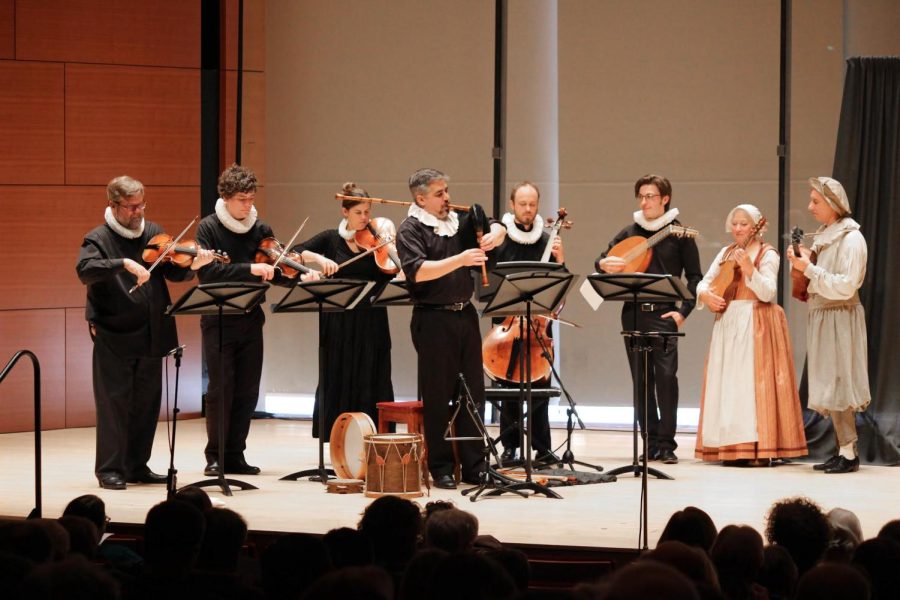‘OG’ early music performers set to retire from Newberry Consort as artistic directors
Photo courtesy of Lauren Carrane
Ellen Hargis and David Douglass perform in a concert by The Newberry Consort. The directing duo is set to retire from the Consort later this month.
April 7, 2022
Heading into college 40 years ago, Ellen Hargis planned to become a linguist. David Douglass, now married to Hargis, had entered as a chemistry major.
But when they graduated, they both had degrees in early music, an era that broadly covers the Medieval, Renaissance and Baroque periods.
“We both joined up the early music ensemble and just completely fell in love with it,” Hargis said. “After we graduated, we got married and went on our journey together as artistic and life partners.”
Known nationwide and internationally, Hargis and Douglass have spent their careers establishing the early music genre. Later this month, they will step down as the co-artistic directors of The Newberry Consort, an early music ensemble in Chicago.
Brandi Berry Benson, a violinist who has performed in over 20 concerts with The Newberry Consort, described the couple as prominent leaders of the field.
“David and Ellen are like the OG,” Benson said. “In my eyes, they really lead the way in staying true to the scholarship.”
Douglass joined The Newberry Consort when it began in 1986 and has been with the group for over three decades. He became the artistic director in 2007. Hargis, who had been a frequent guest artist, joined him two years later as co-director.
As artistic directors, they planned The Newberry Consort’s performances from conception to opening night. Until recently, Hargis and Douglass prepared everything from the music to venue location.
“We used to be kind of a mom and pop organization,” Hargis said. As she listed their responsibilities, Douglass said, “So basically, it means doing everything.”
For Newberry Consort’s upcoming concert, “Four Queens and a Joker,” Hargis said she started with the concept of two hilarious pieces from the 17th and 18th century about playing games. Then she and Douglass delved into learning everything they could about the surrounding context of the music.
Hargis said research plays a crucial role in the process because early music performers recreate how music was played at the time it was written. She said finding cultural context leads to many rabbit holes.
“Once we did a concert that was about how time is expressed in music from the 17th century,” Hargis said. “So we read a whole bunch of scientific papers about how time was measured and how clocks were invented.”
Through their wide-ranging performance, Hargis and Douglass have contributed incredible scholarship to early music, Benson said. Although she had bittersweet feelings about Hargis and Douglass’s retirement, Benson emphasized they will leave a significant legacy.
“They have had — and will continue to have — a big impact on the early music scene,” Benson said. “Everything they have done continues on through people like me who have learned so much from them.”
Email: anniexia2025@u.northwestern.edu
Related Stories:
— NU Declassified: The melody of the music education major
— Bienen graduate students conduct Northwestern Symphony Orchestra holiday concert
— Captured: Bienen fall concert series marks return to in-person performances



